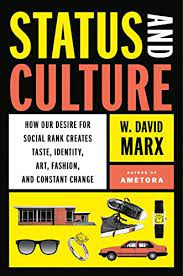You have /5 articles left.
Sign up for a free account or log in.
 Status and Culture: How Our Desire for Social Rank Creates Taste, Identity, Art, Fashion, and Constant Change by W. David Marx
Status and Culture: How Our Desire for Social Rank Creates Taste, Identity, Art, Fashion, and Constant Change by W. David Marx
Published in September 2022
In one of the blurbs for Status and Culture on Amazon, Douglas Rushkoff says that the book “is both a rigorous social analysis and a delightful guilty pleasure.” How many books can you read where you both learn about the rise and fall of Vanilla Ice while engaging with grand cultural theorizing?
W. David Marx, a Tokyo-based writer, has identified the pursuit of status as the prime mover of individual behavior and cultural change. For Marx, status hierarchies are not the result of social structures and competition for scarce resources but their cause.
Pick any social phenomenon you wish to examine, from the banal (such as the precipitous decline of Vanilla Ice’s career following the release of his 1991 movie Cool as Ice) to the existential (such as the rise of right-wing nationalism) and status is the key to understanding what’s really going on.
Privileging status above all other social and psychological drivers may sound ridiculous to every social scientist or humanist who has ever put up a shingle. Undoubtedly, the world is more complicated than a war against all for status.
Well … yes. Of course. Status and Culture contains the sort of grand arguments that would never pass muster with academic peer review. I say this is our loss and not Marx’s, as making sense of something as unwieldy as cultural change through a single construct (status) is equal parts enlightening and good fun.
Marx could have examined academia in Status and Culture to make his arguments. He doesn’t, so I’ll give it a shot.
The higher ed status argument is easy to make at the macro level. What is the institutional fight for rankings, endowments and prestige but a scramble to ascend the status hierarchy?
Higher education is a competitive business. We compete at an institutional level. And we compete to gain the benefits of career achievements. At base, that competition is less about dollars (at least from an academic career standpoint) but status.
One of Marx’s points in Status and Culture is that while status determines all (or most everything), it is impolite to talk too openly about this reality. Status seeking is so ingrained, so much the oxygen we breathe, that pointing out the status competition can seem crude. Let’s do it anyway.
In academia, at least for traditional tenure-track academics, career progression depends on one’s relative place in a competitive status hierarchy. The tenure process of external review relies on the judgments of a scholar’s relative achievements among the subculture (otherwise known as the discipline) in which she operates.
Within the academy, you will come across many who will swear up and down that “titles don’t matter.” Inevitably, these most egalitarian of academics will enjoy the privileges of tenured positions and titles ranging from dean, VP or some brand of provost.
Those navigating a higher ed career on the other side of the tenure divide, and lacking job titles that are legibly weighty to those inside and outside the institution, know quite well where they fit in the academic caste system.
A central point of Status and Culture is that cultural change is most often initiated by those at the top and the bottom of any given status hierarchy. Those at the top can push boundaries, as while they may benefit from the status quo, they are also likely insulated by their privilege. Change is appealing at the bottom of the status hierarchy because there is so much less to lose. It is in the middle of the status hierarchy where conservatism sets in.
The message for higher education is that if we want our institutions to change, we should listen to those with the least status. How might a university be reorganized around the needs of adjunct and contingent faculty? What might be different if the place was set up to benefit first-generation, low-income and other minoritized learners?
Asking these questions about the culture within our institutions may cause us to have some uncomfortable conversations about status. Perhaps reading and discussing Status and Culture would be a safe way to have these difficult conversations.
What are you reading?








